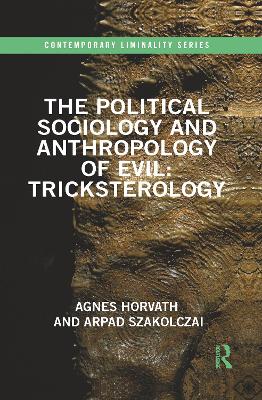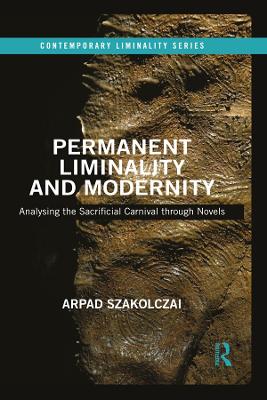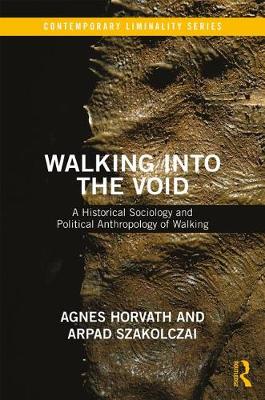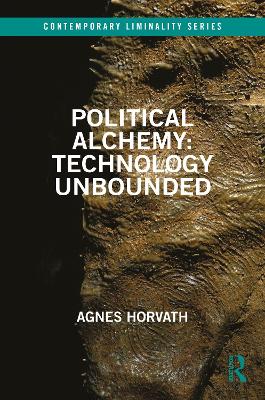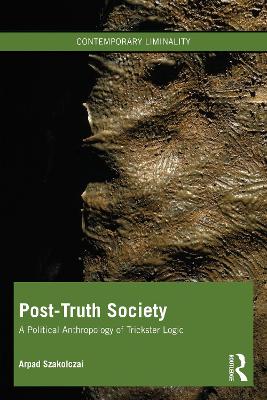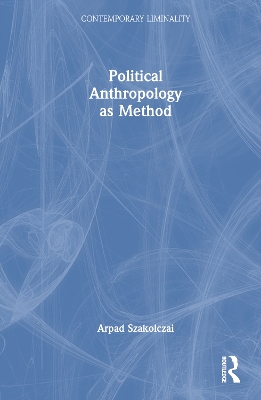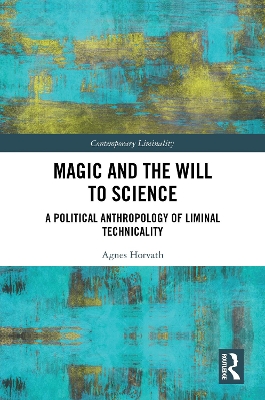Contemporary Liminality
7 total works
The Political Sociology and Anthropology of Evil: Tricksterology
by Agnes Horvath and Arpad Szakolczai
This book offers a new approach to the problem of evil through an examination of the anthropological figure of the ‘trickster’. A lesser known and much more recent term than evil, the authors use the trickster to facilitate a greater understanding of the return of evil in the modern era. Instead of simply opposing ‘good’ and ‘evil’, the figure of the trickster is used to pursue the trajectories of similarities and quasi-similarities through imitation.
After engaging with the trickster as presented in comparative anthropology and mythology, where it appears in tales and legends as a strange, erratic outsider, the authors seek to gain an inside perspective of trickster knowledge through an examination of mythology and the classical world, including both philosophers and poets. The book then goes on to trace the trickster through prehistory, using archaeological evidence to complement the diverse narratives. In this way, and by investigating the knowledge and customs surrounding evil, the authors use the figure of the trickster to provide an unprecedented diagnosis of the contemporary world, where external, mechanical rationality has become taken for granted and even considered as foundational in politics, economics, and technologised science. The authors advance the idea that the modern world, with its global free markets, mass mediatic democracy and technologised science, represents a universalisation of trickster logic. The Political Sociology and Anthropology of the Evil will be of interest to scholars working in the fields of social theory, political anthropology and political sociology, as well as those interested in the ways in which evil can infiltrate reality.
This book offers a comprehensive sociological study of the nature and dynamics of the modern world, through the use of a series of anthropological concepts, including the trickster, schismogenesis, imitation and liminality. Developing the view that with the theatre playing a central role, the modern world is conditioned as much by cultural processes as it is by economic, technological or scientific ones, the author contends the world is, to a considerable extent, theatrical - a phenomenon experienced as inauthenticity or a loss of direction and meaning. As such the novel is revealed as a means for studying our theatricalised reality, not simply because novels can be understood to be likening the world to theatre, but because they effectively capture and present the reality of a world that has been thoroughly ’theatricalised’ - and they do so more effectively than the main instruments usually employed to analyse reality: philosophy and sociology. With analyses of some of the most important novelists and novels of modern culture, including Rilke, Hofmannsthal, Kafka, Mann, Blixen, Broch and Bulgakov, and focusing on fin-de-siècle Vienna as a crucial ’threshold’ chronotope of modernity, Permanent Liminality and Modernity demonstrates that all seek to investigate and unmask the theatricalisation of modern life, with its progressive loss of meaning and our deteriorating capacity to distinguish between what is meaningful and what is artificial. Drawing on the work of Nietzsche, Bakhtin and Girard to examine the ways in which novels explore the reduction of human existence to a state of permanent liminality, in the form of a sacrificial carnival, this book will appeal to scholars of social, anthropological and literary theory.
The book starts by discussing the significance of walking for the experience of being human, including a comparative study of the language and cultures of walking. It then reviews in detail, relying on archaeology, two turning points of human history: the emergence of cave art sanctuaries and a new cultural practice of long-distance ‘pilgrimages’, implying a descent into such caves, thus literally the ‘void’; and the abandonment of walking culture through settlement at the end of the Ice Age, around the time when the visiting of cave sanctuaries also stopped. The rise of philosophy and Christianity is then presented as two returns to walking. The book closes by looking at the ambivalent relationship of contemporary modernity to walking, where its radical abandonment is combined with attempts at returns.
The book ventures an unprecedented genealogy of walking culture, bringing together archaeological studies distant in both time and place, and having a special focus on the significance of the rise of representative art for human history. Our genealogy helped to identify settlement not as the glorious origin of civilisation, but rather as a source of an extremely problematic development. The findings of the book should be relevant for social scientists, as well as those interested in walking and its cultural and civilisational significance, or in the direction and meaning of human history.
This book explores politics as a form of alchemy, understood as the transformation of entities through an alteration of their identities. Identifying this process as a common denominator of many political phenomena, such as EU integration, mediatisation, communism or globalisation, the author demonstrates not only the widespread presence of alchemical techniques in politics, but also the acceleration of their deployment. A study of the steady growth of power as it reaches a continuous and permanent stage, thus avoiding the inherent difficulties connected with birth and death of political organisations and institutions, this volume reveals political alchemy to be a form of self-sustaining growth through sterile multiplication, devoid of meaning. Revealing both the integrative and disintegrative nature of a political process that, while appearing to work in the interests of all, in fact produces apathy, desperate mobilisation and despair by crushing concrete entities such as personality and tradition, Political Alchemy: Technology Unbounded will appeal to scholars of sociology and anthropology with interests in social theory and political thought.
It is widely asserted that we are now living in a post-truth society. What that means, this book argues, is that the contemporary global world is thoroughly infested not only with trickster figures but an entire and operational trickster logic; or, that we now live in a Trickster Land – an argument advanced by the claim that in modernity liminality has become permanent; or that modern life is patently absurd.
The first part of the book presents a series of ‘guides’ to this condition, in the form of key thinkers and writers who can help us understand and navigate our Trickster Land. Such guides include Hermann Broch, Lewis Hyde, Roberto Calasso, Michel Serres, Sándor Márai, Colin Thubron and Albert Camus. The second part goes on to discuss five main regions of Trickster Land: art, thought, the economy, politics and society. This last, central chapter of the book contrasts trickster logic with the basic, foundational logic of social life, presented as gift-giving by Marcel Mauss and as sociability by Georg Simmel, and which is expressed here, combining Heraclitus and Plato with the Gospel of John, by three basic terms of ancient Greek culture, as arkhé charis logos: meaningful social life originally and in its essence is animated by the power of kind benevolence. This volume will appeal to scholars of social theory, anthropology and sociology with interests in political thought and contemporary culture.
This book explores considerations of method in the field of political anthropology, contending that this constitutes a distinct approach within the broader area of the human, social and political sciences. Faithful to the basic guiding ideas of anthropology, it nonetheless challenges and rejects the pretended stance of scientific neutrality and advances a position that engages with the notion of participation, recognising its value and arguing that participation is essential to the development of a proper social and political understanding. An outline of what political anthropology can offer by way of methods, this invitation to consider the development of methodological ideas beyond the presumed ‘scientific’ and ‘universalistic’ approaches that dominate in the social sciences will appeal to scholars of anthropology, sociology and politics with interests in questions of method and methodology.
This book offers a political anthropological perspective on the problematic character of science, combining insights from historical sociology, political theory, and cultural anthropology. Its central idea, departing from the works of Frances Yates and the Gnosticism thesis of Eric Voegelin, is that far from being the radical opposite of magic, modern science effectively grew out of magic, and its varieties, like alchemy, Hermetic philosophy, the occult, Gnosticism, and Neoplatonism. Showing that the desire to use science to solve various – real or presumed – problems of human existence has created a permanent liminal crisis, it contends that the ‘will to science’ is parasitic, existing as it does in sheer relationality, outside of and in between concrete places and communities. A study of the mutual relationship between magic and science in different historical eras, ranging from the Early Neolithic to recent disease prevention ideas, Magic and the Will to Science will appeal to scholars and students of social and anthropological theory, and the philosophy and sociology of science.
